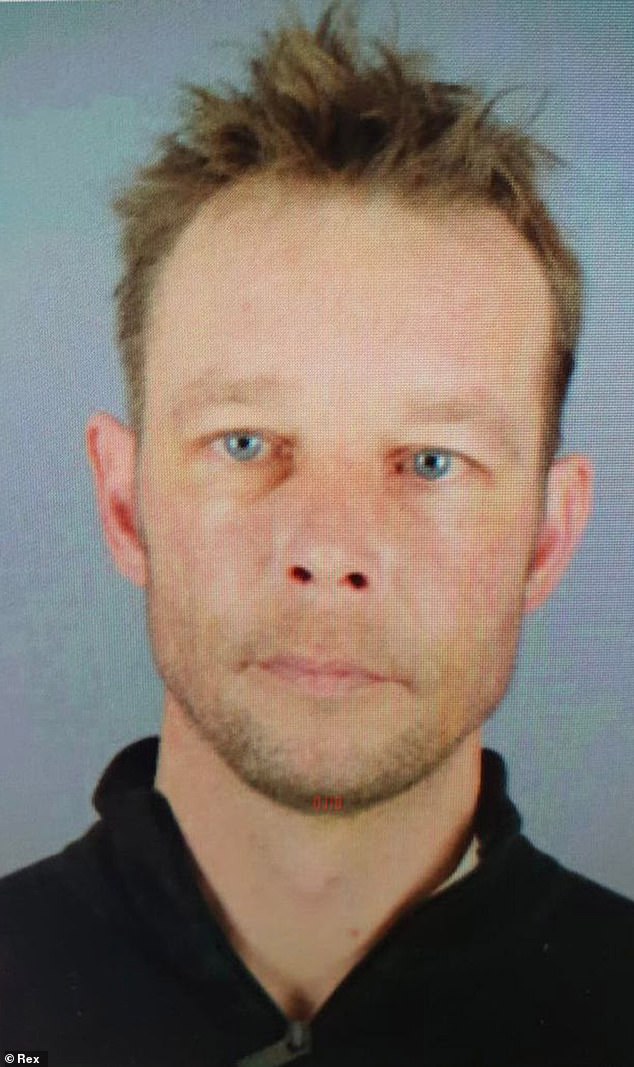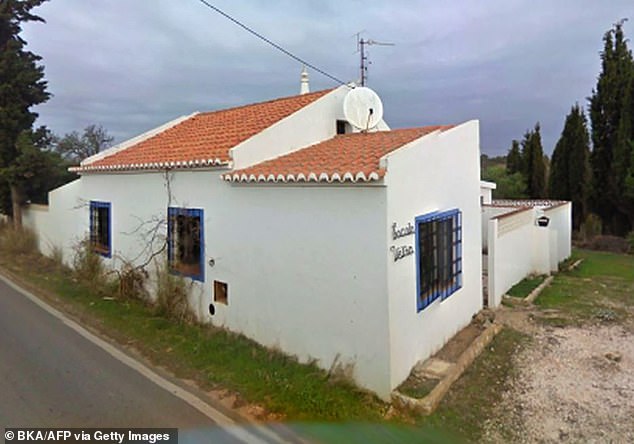A ‘dangerous psychopathic sadist’ in ‘the absolute top league of dangerousness’: The shocking assessment of Madeleine McCann suspect Christian Brueckner by his horrified psychologist
The man suspected by German authorities of murdering missing British girl Madeleine McCann has a string of previous convictions and prosecutors have described him as a ‘dangerous psychopathic sadist’.
Christian Brueckner, 47, is currently serving a sentence in Germany for the rape of a 72-year-old and has previously been convicted of other crimes, including child sexual abuse.
However, Brueckner has yet to be charged in the McCann case, and he was today acquitted of two unrelated child sex crimes and three rape charges. That ended a closely watched trial in Germany that could have kept him behind bars.
Prosecutors last week called for Brueckner to be sentenced to 15 years for the alleged crimes, saying if he were released from prison there was a “high degree of certainty” he would offend again.
But today the judge disagreed, saying Brueckner “could not be convicted of the acts with which he is accused” while acquitting him of the five charges.
During the trial, a psychiatric expert described Brueckner as being in the “absolute upper class of dangerousness,” according to German media reports.
Christian Brueckner arrives at the Landgericht Braunschweig state court on October 7, 2024 for one of the last days of his trial for sex crimes

Madeleine McCann was three years old when she disappeared from her parents’ room while sleeping on holiday in Praia da Luz in May 2007
“You can’t get any higher than this,” said the expert, who predicts a 30 to 50 percent chance that Brueckner will reoffend within two years if released from prison.
Evidence in the trial included notebooks in which Brueckner allegedly documented his sexual fantasies, including a “guide to detailed abuse of children and women.”
The expert described the notes as “horrific” and some of the “greatest perversions” he had ever seen in his professional life.
However, the defense had raised serious doubts about the cases against Brueckner, which were based on testimony but not forensic evidence.
The notebooks seized from Brueckner describing his sexual fantasies were also used as evidence. But despite their disturbing content, they provided no direct link to the alleged crimes.
According to German police, Brueckner lived in the Portuguese Algarve between 1995 and 2007, where Madeleine disappeared during a family holiday.
They say he made a living doing odd jobs in the area and also broke into hotel rooms and vacation homes.
The psychiatric expert said Brueckner has always been “on the margins of society” and has led a “socially isolated, nomadic, parasitic life.”
Brueckner’s current rape sentence runs until September 2025, said Christian Wolters, a spokesman for the prosecutor in Brunswick.
His lawyer Friedrich Fuelscher has said the suspect could be released as early as the spring.

Christian Brueckner, 47, is currently serving a seven-year prison sentence for the 2005 rape of an American pensioner and drug trafficking, and is also the prime suspect in the disappearance of Madeleine McCann. He was today acquitted of five separate charges in a German trial
To ensure that Brueckner is not released, German authorities will now have to prove that he poses a danger to society before they can impose ‘preventive detention’ and keep him behind bars.
Other questions have been raised about Brueckner’s psychological state.
Speaking to Sky News in 2020, a former neighbor in Portugal said Brueckner was “always a bit angry, driving up and down the roadway quickly, and one day… he just disappeared without saying a word.”
According to German media, he lived in Hannover from 2007 and later divided his time between Germany and Portugal for a number of years.
When German police searched an allotment the suspect once owned near Hanover, the owner of a neighboring property, Wolfgang Kossack, told the Daily Mail that Brueckner had lived there off-grid.
‘He never did any gardening. He didn’t plant anything or try to grow anything,” Kossack said. “He was just drinking some beer.”

A house near the Praia da Luz and Lagos resort in the Algarve, Portugal, which was used by Christian Brueckner, a German man suspected of the disappearance of British girl Madeleine McCann
According to the German newspaper Bild, Brueckner was born on December 7, 1976 near Würzburg.
He grew up in a foster home where he was exposed to neglect and violence, including being locked in dark rooms and beaten with a belt, the popular daily said.
According to Der Spiegel magazine, Brueckner was first convicted of child sexual abuse when he was a teenager.
In 2020, his criminal record already contained 17 entries, the report said, including driving without a license, causing bodily harm, theft and driving under the influence.
In 1994, he was first tried in Bavaria for “abusing a child” and “performing sexual acts in the presence of a child,” according to Der Spiegel.
When he was 17 years old, Brueckner received a two-year juvenile sentence, of which he only served part.
In 2016, the Brunswick court sentenced him to one year and three months in prison for “creating and possessing child pornography material,” according to Der Spiegel.
At the time he was revealed as a suspect in the McCann case, Brueckner was serving a sentence for drug trafficking in the northern German city of Kiel.
His prison record documents arrogant behavior, according to media reports, including calling prison staff “torturers.”
